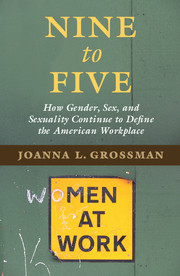Book contents
- Frontmatter
- Dedication
- Contents
- Foreword
- Acknowledgments
- Introduction
- PART I WHAT IS SEX DISCRIMINATION?
- PART II SEXUAL HARASSMENT
- PART III PREGNANT WOMEN AND MOTHERS AT WORK
- PART IV FEMALE BREADWINNERS AND THE GLASS CEILING
- 47 The Supreme Court Slams the Door on Pay Discrimination Claims
- 48 A Call for Congressional Action to Remedy Pay Inequality
- 49 The Lilly Ledbetter Fair Pay Act of 2009
- 50 Taking Stock: Is the Ledbetter Act Working?
- 51 The Lady in Red
- 52 Unfinished Business
- 53 Will ABA's Proposed Solutions for Gender Inequity Work?
- 54 Equality Still Elusive for Women in the Federal Workforce
- 55 “Girlie Men”
- 56 Playing “Too Womany” and the Problem of Masculinity in Sport
- 57 Binders for Women, Blinders for Romney
- Conclusion
- Notes
- Index
48 - A Call for Congressional Action to Remedy Pay Inequality
from PART IV - FEMALE BREADWINNERS AND THE GLASS CEILING
Published online by Cambridge University Press: 05 May 2016
- Frontmatter
- Dedication
- Contents
- Foreword
- Acknowledgments
- Introduction
- PART I WHAT IS SEX DISCRIMINATION?
- PART II SEXUAL HARASSMENT
- PART III PREGNANT WOMEN AND MOTHERS AT WORK
- PART IV FEMALE BREADWINNERS AND THE GLASS CEILING
- 47 The Supreme Court Slams the Door on Pay Discrimination Claims
- 48 A Call for Congressional Action to Remedy Pay Inequality
- 49 The Lilly Ledbetter Fair Pay Act of 2009
- 50 Taking Stock: Is the Ledbetter Act Working?
- 51 The Lady in Red
- 52 Unfinished Business
- 53 Will ABA's Proposed Solutions for Gender Inequity Work?
- 54 Equality Still Elusive for Women in the Federal Workforce
- 55 “Girlie Men”
- 56 Playing “Too Womany” and the Problem of Masculinity in Sport
- 57 Binders for Women, Blinders for Romney
- Conclusion
- Notes
- Index
Summary
The Supreme Court made a mess of pay discrimination law with its ruling in Ledbetter v. Goodyear Tire & Rubber, Inc. Congress should override the ruling – and should also take the opportunity to amend Title VII, the centerpiece of federal protection against employment discrimination, in other ways, as well. The Ledbetter decision requires employees to file a Title VII pay discrimination claim within 180 or 300 days of when the discriminatory decision was first made and communicated to the employee.
As discussed in Chapter 47, the Court's ruling will have disastrous consequences for victims of pay discrimination, who are likely to suffer from salary discrimination that compounds throughout their careers. Moreover, the court failed to effectively address the problem that many discrimination victims are not likely to be immediately aware that their paychecks are affected by discrimination. Congress should step in to restore Title VII protections for pay discrimination victims, as well as to take further measures to ensure that Title VII protects all employees against discrimination.
LEDBETTER'S SILENCE ON WHEN TO START AND TOLL THE CLOCK: DISCOVERY RULES AND EQUITABLE TOLLING
The Ledbetter Court dismissed as “policy arguments” the concerns raised by the dissent about the hardship for employees who do not learn about pay disparities until it is too late. The Court ignored the elephant in the room: What kind of information suffices to place an employee on notice that she has a potential pay claim, so as to start the 180-day clock ticking? The majority simply states that the clock starts to run when the “discriminatory pay decision was made and communicated.”
But exactly what information must be communicated to the employee in order to trigger the statute's short limitations period? Is it enough for the employer to simply specify the employee's new pay level? If so, then Title VII pay claims have just been relegated to the dustbin of civil rights history. Perhaps, more charitably, the majority meant that the time period will start running once the employee learns that she will receive an amount that is less than some of her male comparators who perform similar work will receive? Or perhaps it meant that the time period starts running when she learns she will receive a specified percentage raise that is less than the raises received by others?
- Type
- Chapter
- Information
- Nine to FiveHow Gender, Sex, and Sexuality Continue to Define the American Workplace, pp. 285 - 290Publisher: Cambridge University PressPrint publication year: 2016



